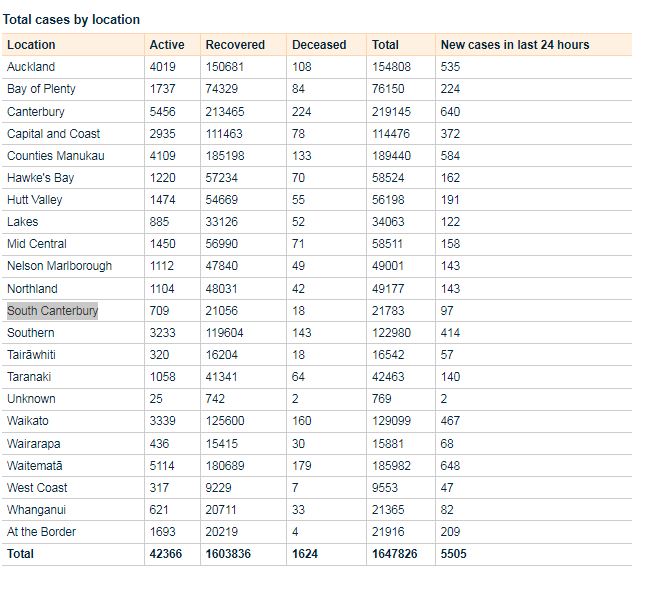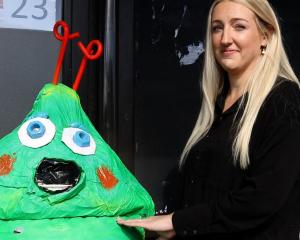Across New Zealand, the Ministry of Health reported 5296 new cases - including 97 in South Canterbury - and 19 virus-related deaths on Friday.
The ministry said there were now 1624 deaths confirmed as attributable to Covid-19, either as the underlying cause of death or as a contributing factor. The seven-day rolling average of deaths attributable to the virus is now 20.
Of the 19 deaths reportied today one person was from Canterbury, four were from Auckland region, one was from Waikato, two were from Bay of Plenty, one was from Tairawhiti, two were from MidCentral, one was from Wellington region, two were from Nelson Marlborough, and five were from Southern. Two were in their 60s, three were in their 70s, nine were in their 80s and five were aged over 90. Eight were women and 11 were men.
There are 605 people currently in hospital with the virus, of which 17 are in ICU, 90 are in Canterbury DHB hospitals and 19 are in South Canterbury hospitals.
The other cases in hospitals across New Zealand are in Northland: 22; Waitematā: 62; Counties Manukau: 51; Auckland: 87; Waikato: 65; Bay of Plenty: 26; Lakes: 15; Hawke's Bay: 24; MidCentral: 24; Whanganui: 8; Taranaki: 18; Tairāwhiti: 2; Wairarapa: 3; Capital & Coast: 24; Hutt Valley: 12; Nelson Marlborough: 21; West Coast: 5; and Southern: 27.
The average age of patients in hospital is 66. The seven-day rolling average of hospitalisations is 721, down from 796 a week ago.
The national seven-day rolling average of community case numbers is now 5812 - down from last Friday when it was 7618.
The number of active cases in New Zealand is now 40,673, which includes 5456 in Canterbury and 709 in South Canterbury.
 Covid expert's second wave warning
Covid expert's second wave warning

An infectious diseases modeller says there are likely to be thousands of new Omicron cases every day for the foreseeable future as the current second wave subsides until a new variant emerges.
Auckland University computer science senior lecturer Dr David Welch said unlike the eradication of the earlier Covid-19 variants in 2020 and 2021 Omicron would stay in the community until it was superseded by a new strain.
And despite the second wave having peaked earlier than expected, New Zealand was unlikely to see the virus eradicated or even fall to hundreds of new cases a day. Instead it would "trickle on" in the thousands until the next wave.
"We're not going to get down to those levels. I think it'll be similar to the first peak we had. We had a plateau pretty much and that's what you're seeing around the world. The infection finds people who either haven't been infected before or who have waning immunity and that kind of trickles on.
"There's been quite a lot more people infected in this second wave so the number of people out there who can maintain the plateau is lower. We expect that plateau to be lower this time but it's still in the thousands."
Welch said the plateau would likely be a meaningfully lower than the first wave, getting down to 3000 a day.
However, this would all change once a new variant arrived across our border.
"I also expect new variants to arrive at some point and start us up back in the other direction," said Welch.
The name of the game at this stage was to avoid contracting the virus for as long as possible and if you did get it, to avoid reinfection.
Those who had managed to avoid getting Covid were now at a little more risk of getting it in the next wave and people needed to maintain their immunity where they could through boosters, he said.
The vaccine had proved effective preventing infection and transmission against the Delta strain but unfortunately it hadn't been updated to counter the Omicron variant.
This meant we would not be in the same situation where the virus was all but eliminated from the community, he said.














